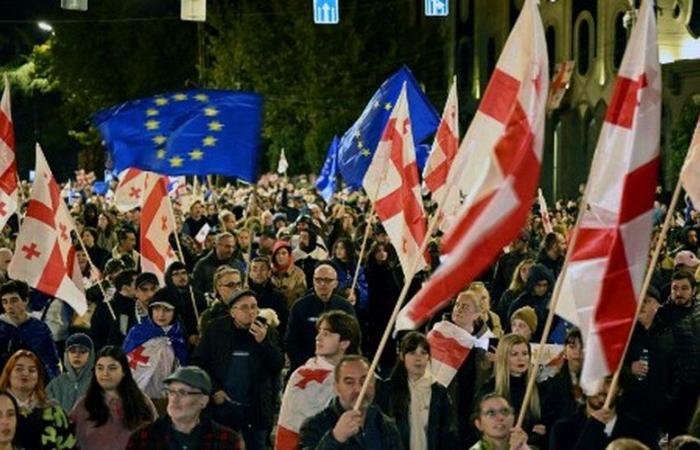
the essential
Thousands of demonstrators took to the streets in Georgia this Monday, November 4, to express their discontent following the results of the last elections. What is happening in this small country neighboring Russia which dreams of Europe?
Anger is brewing in Georgia, a small country south of Russia. Monday, November 4, the pro-European opposition called on its supporters to demonstrate to contest the results of the legislative elections of October 26, which it refuses to recognize, denouncing fraud and interference from its powerful Russian neighbor.
What were the results of the last elections?
On Saturday, October 26, the Georgian Dream party, which has been in power since 2012, won the parliamentary elections with 53.9% of the vote, compared to 37.7% for the opposition. Quickly, the pro-European party, defeated, refused to recognize this vote count. An official recount followed three days later at polling stations. But it “did not lead to any significant modification of the official results previously announced”, as the electoral commission declared, cited by AFP.
Also read:
“Do we want a European future or Russian slavery?” : in Georgia, the opposition remains mobilized
What is the opposition demanding?
Firstly, the holding of a new vote, because she considers that the first vote was “stolen”. The European Union, the United States and international observers, such as the OSCE (Organization for Security and Cooperation in Europe), have highlighted “pressure” and a climate of tension during the election, without however calling into question formally causes the results.
Is Russia to blame?
Not officially. While this election was seen as a test for a country which aims to join the European Union as well as NATO, the Georgian Dream party won, which is not going in this direction. Because the latter is suspected of being very close to Moscow. Georgians fear that this victory for the party founded by billionaire Bidzina Ivanishvili, who made his fortune in Russia, will lead to increased influence from Moscow in Georgian domestic politics, to the detriment of the country's pro-European aspirations.
“We are witnesses and victims of a special Russian operation, a modern form of hybrid war against the Georgian people,” declared the pro-European Georgian president the day after the elections.
Proof of the ties that unite Moscow and the Georgian Dream party, Viktor Orbán, the Hungarian Prime Minister, traveled to Georgia on Tuesday, October 29 to congratulate his counterpart, Irakli Kobakhidze. The elections were “free and democratic”, said the Hungarian nationalist leader. Viktor Orbán's excellent relations with Vladimir Putin are well established, and his visit reinforces the impression of Russian influence over this small Caucasian republic.
What are the opponents planning?
On Monday, November 4, supporters of the pro-European party called for demonstrations in Tbilisi, as well as in the country's main cities. The objective? Make power bend and reverse the “stolen” elections. “Everyone is waiting for Monday,” declared Thorniké Gordadze, a teacher at Sciences Po, in the Georgian capital, to the Progress. Already last week, tens of thousands of Georgians took to the streets of the capital. “We want a free and European Georgia, without Russian influence!” some demonstrators chanted.
Why compare Georgia with Moldova?
Moldova, also a former Soviet republic, called its citizens to the polls on Sunday November 3 to elect their head of state. The similarities continue since the vote pitted a pro-European candidate, the outgoing president Maia Sandu, against an influential oligarch, Alexandr Stoianoglo, supported by the pro-Russian socialists. But this time it was the pro-European camp which won the second round of elections with 55.41% of the votes.
A relief for the EU, which officially opened accession negotiations with this small country of 2.6 million inhabitants in June. This narrow victory, however, conceals deep divisions in this former Soviet republic.





